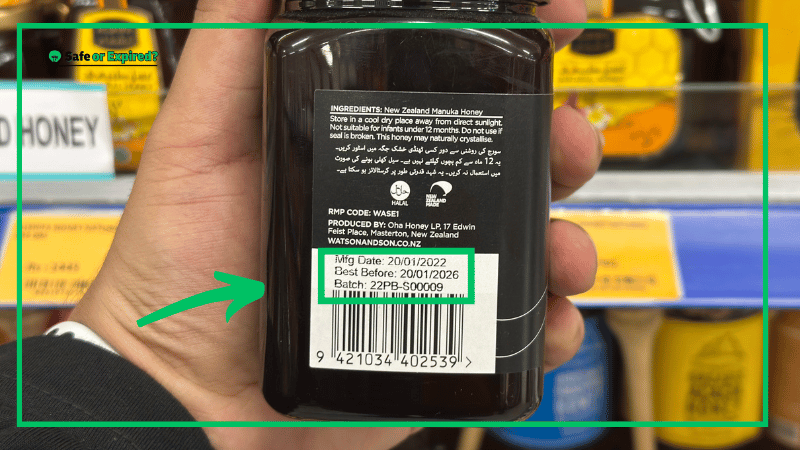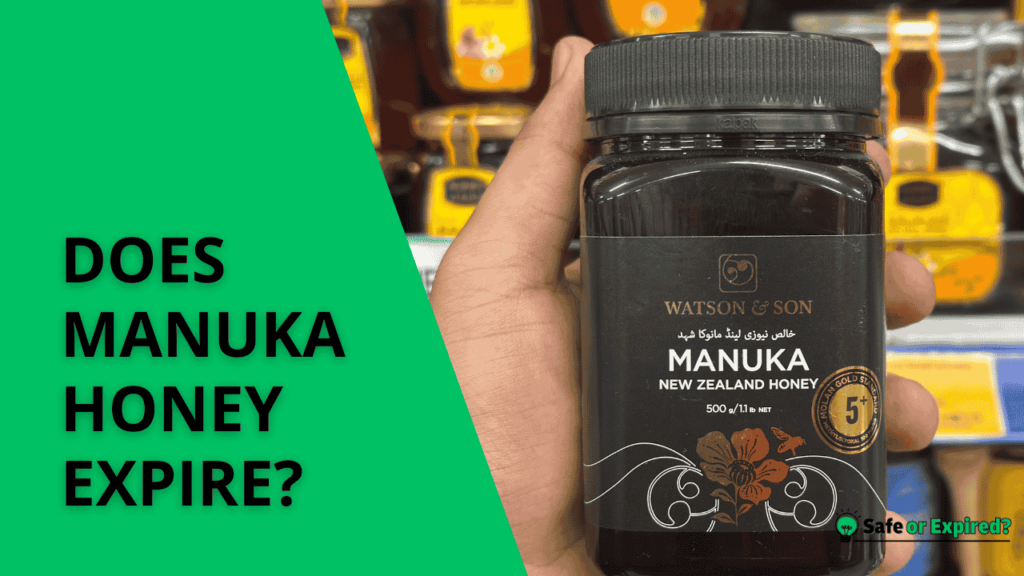“Does manuka honey expire?” is something you might ask if you’re cautious about food safety and shelf stability. Note that it does expire, but there’s much more you should know. Read more to learn why Manuka honey is so tough against time and some easy tips for you to keep it in tip-top shape.
Does Manuka Honey Expire? [the nitty-gritty]
Manuka honey does not expire in the traditional sense. It’s natural antibacterial properties help it maintain its quality over time, making it safe to consume for years beyond its “best before” date if stored properly.
Manuka honey from New Zealand is special because it lasts a really long time, even longer than other kinds of honey and many foods. This is because it has a lot of germ-fighting ingredients called methylglyoxal (MGO). Along with not having much water and being a bit acidic, this keeps bad germs away.
So, Manuka honey stays good and keeps its health benefits for a long time. But, you have to store it correctly – keep it out of the sun and make sure the lid is on tight to keep its good stuff safe.
How Long Does Manuka Honey Expire?
Manuka honey has a long shelf life and typically expires after a decade. Manuka honey’s lifespan is remarkably extensive, thanks to its natural composition and antibacterial properties. Its quality and safety do not degrade as quickly as other products might.

Why Does Honey Have an Expiration Date? [the truth]
Honey has an expiration date mainly due to regulatory requirements, ensuring uniform food safety standards across all products. While honey’s natural properties allow it to last indefinitely, the date guides consumers on optimal quality and taste, encouraging proper storage practices to maintain its best condition over time.
Regulatory Compliance: Navigating Food Safety Standards
All foods, including honey, must follow certain rules that often require a “best before” date on the packaging. These rules help everyone know how to keep food safe and fresh. Even though honey naturally lasts a long time, these dates are added to ensure it meets these rules.
Quality Assurance: Guaranteeing Optimal Enjoyment
This date is more about keeping honey tasting great than keeping it safe. Honey can change in color, texture, and taste over time, especially if it gets too warm or too damp. The date helps ensure you enjoy your honey when it’s at its yummiest. Even though honey doesn’t go bad, it can get grainy or change a little in flavor afterward. So, the date tells you when it’s best to use it for the best taste.
Consumer Expectations: Building Trust and Confidence
Seeing a “best before” date helps you feel sure about what you’re buying and eating. It’s a simple way for honey makers to show you how long your honey will stay delicious. This helps build trust and makes sure you’re happy with your honey.
Storage and Handling Conditions: Emphasizing Proper Care
Even though honey lasts long, where and how you keep it can make a big difference. The “best before” date also reminds us to store honey the right way. Too much wetness can make honey ferment (get bubbly and taste off), and too much heat can make it not as nice to eat. So, this date encourages us to keep our honey in a cool, dry place to enjoy it for as long as we can.
When learning about whether Manuka honey expires and how to keep it fresh, it’s interesting to consider other sweet treats and their shelf life. Take lollipops, for example. Do they stay good forever, or do they eventually go bad? If you want to know the signs that a lollipop might be expired, check out “Can Lollipops Expire, and If So, How Can You Tell?”
Does Manuka Honey Really Work if It Is Not Expired?
Yes, Manuka honey remains effective if it is not expired, retaining its potent antibacterial properties and health benefits. Its unique composition ensures it continues to support wound healing, skin health, digestion, and immunity as long as it’s stored properly to preserve its quality and potency over time.
Fighting Germs with Manuka Honey
Manuka honey is famous for its strong germ-fighting powers, mostly thanks to something called methylglyoxal (MGO). Research shows that MGO makes Manuka honey really good at beating tough germs, even the ones that medicine has a hard time with.
Healing Wounds and Keeping Skin Happy
Studies say Manuka honey is great for helping cuts heal faster and making skin look better. Its germ-fighting and anti-swelling powers speed up healing, lower the chance of infection, and calm skin problems.
Good for Your Tummy and Immune System
Manuka honey can also make your digestive system feel better, easing tummy troubles. Plus, it helps your body fight off sickness by boosting your immune system.
Packed with Antioxidants
Manuka honey is full of antioxidants, which are your body’s helpers in fighting off damage and swelling. These helpers might even stop long-term health problems and keep you feeling healthy.
Things to Keep in Mind
Manuka honey keeps working well if it hasn’t gone bad and if you store it right. While it’s great for your health, it’s not a replacement for seeing a doctor if you’re really sick.
In short, as long as your Manuka honey hasn’t gone bad and you keep it stored properly, you can enjoy all its health perks. From fighting germs to helping your immune system, Manuka honey is a handy natural remedy for lots of health issues.
And what about Ferrero Rocher chocolates? They’re often saved for special occasions, but how long do they actually last? Find out how they compare to other chocolates in terms of shelf life in “Does Ferrero Rocher Expire? Comparison with Other Chocolates.”
How to Store Manuka Honey To Avoid Early Expiration?
To Store Manuka honey to delay expiry, put it in an airtight container. Keep it away from direct sunlight and significant temperature changes. Using clean utensils when handling honey prevents contamination and ensures its beneficial properties are preserved for as long as possible.

Keep It in a Cool, Dark Place
Storing Manuka honey in a cool, dark environment away from direct sunlight helps preserve its quality and potency. Sunlight can cause honey to darken and lose some of its beneficial properties.
Use an Airtight Container
Ensure Manuka honey is stored in an airtight container to prevent moisture from entering. Moisture can lead to fermentation and spoilage, reducing the honey’s quality and effectiveness.
Avoid Extreme Temperatures
Fluctuations in temperature can affect the consistency and quality of Manuka honey. Avoid storing it near heat sources. Furthermore, don’t place it near any place where the temperature changes drastically (like near a stove or refrigerator).
Use Clean Utensils
Always use a clean, dry spoon or utensil to prevent contamination when using Manuka honey. Introducing moisture or food particles into the honey can promote yeast or bacteria.
Do Not Refrigerate
Refrigerating Manuka honey is unnecessary and can lead to crystallization, making it difficult to use. Honey’s natural composition allows it to be stored safely at room temperature.
Keep the Lid Tightly Sealed
After each use, ensure the lid of the honey container is tightly sealed. This prevents air and contaminants from entering, maintaining the honey’s purity and extending its shelf life.
By following these storage tips, you can help ensure that your Manuka honey maintains its beneficial properties and avoids early expiration, allowing you to enjoy its unique health benefits for as long as possible.
FAQs
How Long Does Manuka Honey Take to Work If It Is Not Expired?
The timeframe for Manuka honey to exhibit its effects depends on its intended use. Improvements can be noticed for topical applications, such as wound healing, within a few days to a week. It might take a few weeks to observe significant benefits when ingested for internal health benefits, such as digestive improvements or immune support. Consistency and the specific conditions being addressed are crucial in determining how quickly you may notice results.
Can I Eat Expired Manuka Honey?
Yes, it’s generally safe to eat Manuka honey that has passed its labeled expiration date. It’s also essential to ensure it has been stored correctly and check for any signs of fermentation or spoilage, such as an off smell or taste.
How to Tell if Manuka Honey Has Expired?
True spoilage in Manuka honey is rare due to its antibacterial properties. However, improper storage can lead to undesirable changes. Signs that Manuka honey may not be at its best include:
- Crystallization: While this is a natural process that doesn’t indicate spoilage, some prefer honey in its liquid form.
- Fermentation: If the honey has absorbed moisture, it may ferment, indicated by a bubbly texture and a slightly alcoholic or sour smell.
- Changes in Color or Smell: Any drastic changes in color beyond natural darkening or an off smell can indicate that the honey isn’t in its optimal state.
Conclusion
Manuka honey is pretty amazing because it doesn’t spoil like other foods. To make sure we can enjoy its goodness for a long time, here are some simple but important tips:
- Manuka honey stays good for years thanks to its natural germ-fighting power.
- Keeping it in a cool, dark spot in a tight jar stops it from going bad.
- Even past the date on the label, it’s usually safe to eat if you’ve stored it right.
So, enjoy your Manuka honey without worrying too much about it going bad. Remember these tips; your honey will be ready whenever you need a sweet health boost!

